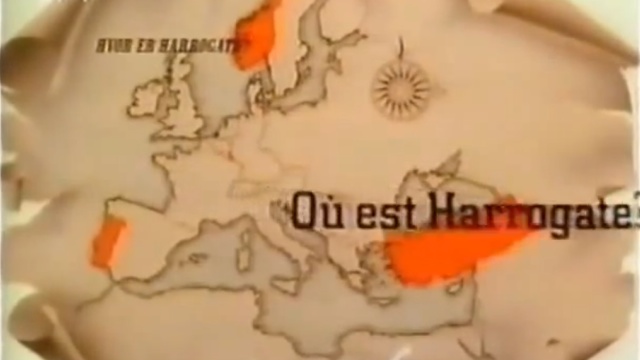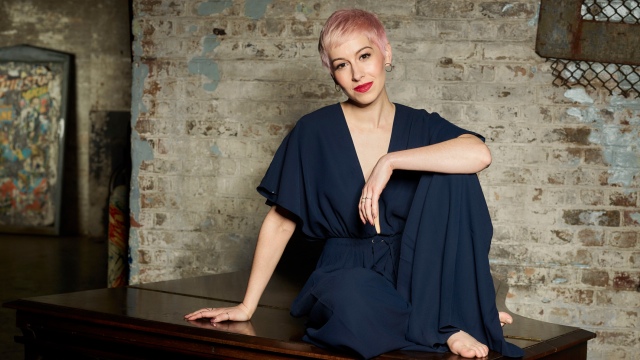Not since 2011 has the UK entry finished in the top half of the Grand Final (the proverbial left hand side of the table) with Blue’s ‘I Can’. The last five results read 24-24-15-24-26. With BMG’s help, so the fan theory goes, that’s all going to change in Rotterdam.
Before you start singing something better than “It’s coming home” and booking hotels around the Harrogate International Centre, let’s take a breath and look at the situation with some words of caution.

Where Is Harrogate? (EBU/BBC)
Say Wonderful Things
First up, words are important, so let’s take a closer read at the press release not for what it says, but what it doesn’t say:
Following a process in which BBC Studios approached a number of record labels to pitch ideas for 2020, it was clear that BMG shared the BBC and BBC Studios’ vision of selecting a song with broad international appeal and securing an artist who embodies the spirit and values of the Eurovision Song Contest.
BBC Studios will be working alongside BMG’s UK music publishing and frontline recordings team based in London to select the United Kingdom’s Eurovision 2020 entry which will then be released and published by BMG.
Everything is focused on the selection process. There is nothing that confirms that BMG will be heavily involved after the process of song selection. The natural assumption is that the act’s record label would be actively involved in the journey to the Ahoy, but the question is by how much? It could swing from doing little more than a minimal publication by uploading the track to digital services (and signs over the required rights to Universal for the Eurovision album), right up to a multi-million pound promotional campaign across the voting countries.
Knock, Knock, Who’s There
BMG has rather a lot of artists signed to it, and many more under consideration. The press release may mention acts such as Lewis Capaldi, George Ezra, Kylie Minogue, and Mans Zelmerlow, but I suspect that BMG are not going to offer up a big name to the BBC. A big name would be unlikely to risk the productive part of their career to disappear for six months into the Eurovision world, as discussed previously on ESC Insight:
Ultimately every performer who enters Eurovision will lose, apart from the single winner from the Grand Final (and then they have a short window to capitalise on that success). As of January 31st [2014], I’ve been able to confirm 8,427 acts who have submitted a song to a national broadcaster. All of them must dream of taking to the stage in Copenhagen and winning the Contest, and all of them must know that’s an incredibly long shot. Losing at Eurovision is as close to being guaranteed as being a certainty.
It’s more likely that names further down the list are going to be put up for a National Final (presuming there is a National Final, although as we went to press BBC News was reporting this would be an internal selection). We’re more likely to get acts of the calibre of Maid, Goldstone, and Darline than Little Mix, HAIM, or First Aid Kit.
Presumably whoever wins through the selection process will need to sign a contract with the BBC to represent the United Kingdom at the Song Contest, and it’s going to be a similar contract to previous years. In which case let’s remind ourselves of Surie’s thoughts on the restrictions:
Despite not being a BBC employee, SuRie has also been obliged to adhere to the corporation’s impartiality rules while competing. “I’m allowed no political opinions, but there are a lot of political questions at Eurovision, and I have to stay completely neutral,” she says. “I can’t give opinions as it doesn’t align with the BBC way.”
From what we can see today, BMG’s participation does not enhance the argument for an established act to represent the United Kingdom at the Eurovision Song Contest. Do you think that this collaboration between the BBC and BMG will improve the standing of the Song Contest in the mainstream press? Will The Sun suddenly be happy to support something European because a record label is involved? Will it open up new avenues for artists to help develop their career beyond the televised show?

SuRie, BBC You Decide 2018 (image: BBC/Joel Anderson)
In the profile, Surie also subtly brought up the issues around budgets:
Back in London, I’d brought up the financials of representing Great Britain with SuRie, having assumed there would be a substantial contract and pay package given the workload she has to take on. “I get a one-off fee for the show itself, but that’s it,” she’d told me bluntly. “I just need to survive. If I had a waitressing job they’d have said, ‘Keep your shifts and we’ll work around it.'”
The BBC is funded by the public and is limited in what it can spend its money on. It has money to put on the Song Contest (and a reserve fund for big ‘surprise’ events each year such as royal weddings, general elections, and hosting the Contest if it were to win). It is allowed to spend a sensible amount of money promoting its own shows to a UK audience, but the BBC can’t justify promoting a privately owned song to a German audience.
If this new collaboration is going to have a significant impact on the UK’s final result, BMG is going to need to spend money. Lots of money. Lots of its own money. It’s going to have to promote the Song Contest entry hard. I suspect the last time that that happened with a UK entry was in 2009 with Andrew Lloyd Webber and Jade Ewen’s ‘It’s My Time’, which was the last Top Ten entry for the UK.
Love Enough For Two
I can see all of these problems, yet my heart is still a-flutter. This is, after all, the Eurovision Song Contest, and I want every country to deliver the best possible entry into the competitive side of the event – even if it is at its very heart just a big flashy TV show with lots of pyro and not enough guitars.
Collaboration is a good thing. The BBC know the TV and Radio landscape. In the UK the Song Contest is a huge ratings winner, capturing the top slot in that week’s ratings and one of the few TV broadcasts that everyone in the country watches live. The BBC instinctively knows how to promote TV shows to get the UK public watching. The BBC does not instinctively know how to create a hit song.
If the staff in the BBC knew music as well as they knew TV, well, …they’d be working at companies like BMG. So connecting TV expertise with music expertise for me is one of the key value exchanges in today’s news.
This will require commitment and trust on both sides. The best way for this to work, in my opinion, is that the BBC focuses solely on putting on the TV show, and leaves every musical and artistic choice to BMG. If I had just one question to ask about all of this, it would be simple. Who is at the top of the chain of command of the UK entry to the Eurovision Song Contest in 2020. Not the televised show, but the three minutes on stage. Does the ultimate power belong to BMG or with the BBC? When there is a conflict of vision regards the music, the staging, the video, or the promotion of the song, who makes the final call?
Looking High, High, High
The mark of a good organisation is working out where your weaknesses are, and finding a way to address them. A collaboration between the BBC and BMG for the Eurovision Song Contest in 2020 is a good start, although it would be remiss to not point out that other broadcasters have similar and stronger relationships with music companies.
The UK now has a renewed approach, there is a wider pool of music to find 2020s Song For Europe, and with new voices in the team that means different choices can be taken with the UK’s entry to find success.
That sounds good to me.










I’m not expecting an established act, but my hope is that with BMG being involved, they will be able to persuade their songwriters to submit decent songs. They can do a separate search for the singer, who will probably be of the usual calibre we send, but really most years the song has been more of a problem than the singer, so focusing on the song seems to be the best approach.
It’s got to be better than the songwriting camps where they’re just been giving us inoffensive “written by committee” “Eurovision by numbers”.
regarding question over NF, the article writer says on Twitter..
@musiciany Hi yes, the press release didn’t spell it out, but they have confirmed there will be no public selection. It’s fun to go through this list and guess who BMG have in mind. Maybe Rick Astley, Peter Doherty or Morrissey…
I know it will probably be a nobody but wouldn’t Jack Savoretti (who is on BMG) be absolutely perfect?!
Why do you reckon that the UK would need lots of promotion ahead of the song contest, when other countries get away with minimal promo? Is it because of the B-word?
If the act managed minimal promotion outside of the UK compared to the current state of play, that would be an improvement!
If it’s going to be an internal selection that is right way to go. I actually think the UK got a lot of things right in 2014 with Children of the Universe. 2015, as we know, was a disaster. But they should have put that one down to experience and persisted. But it was as if the BBC got cold feet and decided to reintroduce national finals, so the public and not the BBC got the blame when things went wrong. This has led to some very bland middle of the road fare as far as the songs are concerned.
On a wider topic, I think the BBC have been slow to catch on that the Contest has changed and has become more musically credible and popular with the UK public. Interestingly, in recent years ITV’s Good Morning Britain have had a live reporter on the ground reporting from the contest every day. I never thought I’d say this, but I’m beginning to wonder if ITV wouldn’t do a better job of Eurovision than the BBC.
We are guilty of trying too hard in this contest which never works. Our songs are too formulated, serious and strait jacketed unlike other Euro nations whose are tongue in cheek and relaxed, and normally do a lot better. I can’t therefore see this partnership making one iota of difference.